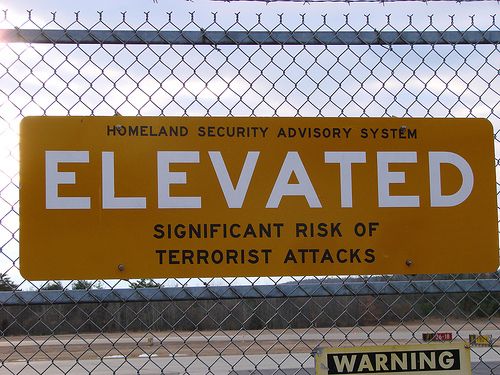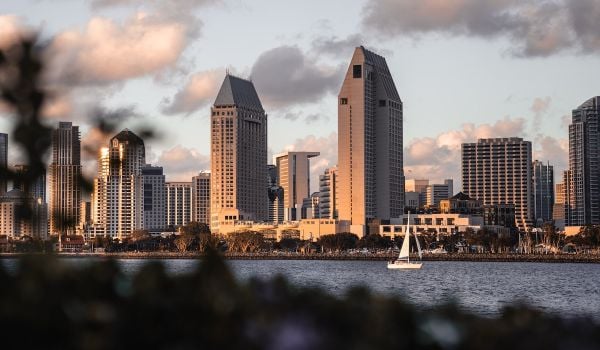Two major incidents occurred in the United States in the past three weeks. One was stopped by a t-shirt vendor and resolved in 52 hours; the other, by conservative estimates, pumped 15,000 barrels of crude oil into the Gulf of Mexico during the same time period. Which do you suspect is getting more media attention? Which do you suspect is getting more attention from the federal government? More importantly: which is the real threat to the American people?
When President Obama visited Venice, La. — the base for cleanup operations in the Gulf — and said that BP would be held financially responsible for the spill’s cleanup, this was viewed as some sort of victory over Big Oil. Finally, they would be held accountable for the damage they do to the environment! Aside from that, the administration has done very little to take the lead on the cleanup of the spill — for the most part, they’re helping out BP. Just today, President Obama announced his intention to split the Material Management Service — the wing of the Department of the Interior tasked with overseeing all aspects of offshore drilling — into two entities: one that handles the regulation of offshore drilling, and one that handles leasing and royalties collection. This should, hopefully, prevent the capture of the regulatory function of the MMS by private industry. But the administration has said nothing so far about the larger, structural questions that loom over whole incident, namely, shouldn’t the spill raise doubts about oil dependence in general? And, what should the federal government’s involvement be in cleanup efforts when the disaster in question was caused by a private company, but poses serious risks to public interests?
It seems difficult to trust BP with the cleanup of the spill given the fact that they are a multinational corporation beholden to their shareholders, and not the American public. Isn’t this where our federal government could demonstrate that our Army Corps of Engineers, Coast Guard and National Guard are more than capable of coordinating the cleanup of the oil spill, with no motive but ensuring the safety and health of the US people and environment? BP could still pick up the tab.
And, even if BP does the best job possible to stop the flow of oil from the well, shouldn’t the federal government at least be talking about the implications of the spill on the future of our energy policy? This is especially important considering Obama recently shocked liberals by expressing support for offshore drilling on the Eastern seaboard. If it wasn’t already, this stance will become hard to defend as the slick starts damaging fisheries all across Louisiana’s coast.
In the meantime, the administration has remained mostly silent on the matter, while being able to use their time with the press to discuss the finer details of whether a terrorist should be read his/her Miranda rights or not, because of the media circus surrounding Faisal Shahzad’s failed attempt to bomb Times Square. But these sort of considerations are little more than an opportunity for political posturing and grandstanding. Is it really a matter of national security whether a terror suspect is made aware of their right to remain silent? Isn’t a 5,000-barrel-a-day oil leak a more pressing matter of national security?
The overall trajectory of terror attacks in the US since September 11th has been towards the more pathetic and desperate end of the spectrum, suggesting that we may be successfully dismantling terrorist networks’ capacity to wreak havoc from afar. And, as the Deepwater Horizon Spill is demonstrating, as we search deeper and deeper for oil, the risks multiply exponentially; it seems BP has no clue how to stop an oil leak at this depth, and the emergency systems in place — massive hydraulic scissors, essentially — were most likely compromised due to the immense water pressure one mile below sea level.
Obama is no stranger to framing our dependence on oil in national security terms. Outlining his plan for energy independence in Washington last January, Obama said:
“America’s dependence on oil is one of the most serious threats that our nation has faced. It bankrolls dictators, pays for nuclear proliferation and funds both sides of our struggle against terrorism. It puts the American people at the mercy of shifting gas prices, stifles innovation, and sets back our ability to compete. These urgent dangers to our national and economic security are compounded by the long-term threat of climate change, which, if left unchecked, could result in violent conflict, terrible storms, shrinking coastlines, and irreversible catastrophe.”
Of course, Obama is mainly referring to foreign oil here, but it should now be clear that our dependence on oil for our energy is a threat to our prosperity and health, even if it is domestically drilled. Obama campaigned on this issue, and now that it is competing with a petty terrorist for space above the fold, the administration is being surprisingly taciturn.
Suspicious packages aside, Times Square was back to normal one day after Shazhad’s fireworks show; our Gulf Coast may be suffering for years to come, depending on the caprices of the winds and tides in the Gulf. But in these winds, tides, and the massive water pressure that render all relief efforts futile lies a glimmer of hope: perhaps, given the right incentives from the federal government, these forces that are spreading the slick can one day be harnessed to guarantee that we will never have an oil spill of this magnitude again.







_600_350_80_s_c1.jpg)








